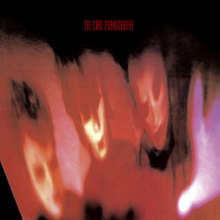Pornography (album)
| Pornography | ||||
|---|---|---|---|---|
 |
||||
| Studio album by The Cure | ||||
| Released | 4 May 1982 | |||
| Recorded | January–April 1982 | |||
| Studio | RAK Studios, London, England | |||
| Genre | ||||
| Length | 43:29 | |||
| Label | Fiction | |||
| Producer |
|
|||
| The Cure chronology | ||||
|
||||
| Singles from Pornography | ||||
|
||||
| Professional ratings | |
|---|---|
| Review scores | |
| Source | Rating |
| AllMusic | |
| Blender | |
| Encyclopedia of Popular Music | |
| Entertainment Weekly | B |
| Mojo | |
| Pitchfork | 8.4/10 |
| Rolling Stone | |
| The Rolling Stone Album Guide | |
| Uncut | |
| The Village Voice | C |
Pornography is the fourth studio album by British alternative rock band the Cure, released on 4 May 1982 by the record label Fiction. Preceded by the non-album single "Charlotte Sometimes" late the previous year, Pornography was the band's first album with a new producer, Phil Thornalley, and was recorded at RAK Studios from January to April. The sessions saw the group on the brink of collapse, with heavy drug use, band in-fighting and group leader Robert Smith's depression fuelling the album's musical and lyrical content. Pornography represents the conclusion of the group's early dark, gloomy musical phase which began with Seventeen Seconds in 1980.
Following its release, bass guitarist Simon Gallup left the band and the Cure switched to a much brighter and more radio-friendly new wave sound. While poorly received by critics at the time of release, Pornography was their most popular album to date, reaching No. 8 in the UK charts. Pornography has since gone on to gain acclaim from critics, and is now considered an important milestone in the development of the gothic rock genre. The band has performed the album live in its entirety as part of the Trilogy concerts.
Following the band's previous album, 1981's Faith, the non-album single "Charlotte Sometimes" was released. The single, in particular its nightmarish and hallucinatory B-side "Splintered in Her Head", would hint at what was to come in Pornography.
In the words of Robert Smith, regarding the album's conception, "I had two choices at the time, which were either completely giving in [committing suicide] or making a record of it and getting it out of me". He also claims he "really thought that was it for the group. I had every intention of signing off. I wanted to make the ultimate 'fuck off' record, and then sign off [the band]". Smith was mentally exhausted during that period of time: "I was in a really depressed frame of mind between 1981 and 1982". The band "had been touring for about 200 days a year and it all got a bit too much because there was never any time to do anything else".
...
Wikipedia
